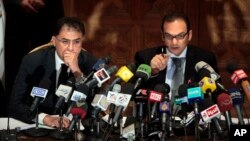Egypt's highest appeals court will decide on April 5 in the so-called “foreign funding” case involving international non-governmental organizations accused of stoking unrest during the country's 2011 Arab Spring uprising.
The announcement by the Court of Cassation in Cairo affects 16 defendants who were detained shortly after the uprising during police raids of their organizations and given suspended prison terms in 2013 for operating without proper licensing.
If the appeal is accepted, the case will be retried in a criminal court. The defendants were among 43 people, including Americans and other foreigners, initially held, although most fled the country and were sentenced in absentia.
The case is part of Egypt's ongoing pursuit of NGOs that began when a post-uprising government report accused them of using millions of dollars in foreign funds to foment chaos in Egypt. Their convictions on technical violations however did not prove this.
Mohamed Zaree, manager of Egypt's oldest rights group the Cairo Institute for Human Rights Studies, said the court could have ruled but postponed the date to land after the March presidential election in which Abdel-Fattah el-Sissi, Egypt's general-turned president, faces no serious challenger.
“They aim to silence the international community over what's happening -- the kidnapping and arrests of candidates,” he said. “The NGOs are clearly innocent. Hopefully after the election it will all be lifted so the government can declare it's turning a page.”
After a string of would-be challengers to el-Sissi were arrested, forced out or quit the race, raising the prospect of a virtual referendum similar to Egypt's previous autocrats, an obscure, face-saving candidate registered to run at the last minute. He himself was a vocal el-Sissi supporter until then.
El-Sissi rose to power in 2013 after ousting his divisive, now-jailed Islamist predecessor who won the country's first free election the year after a mass uprising overthrew longtime autocrat Hosni Mubarak in 2011.
The NGO case, part of Egypt's broader fixation on alleged foreign meddling in its affairs, was expanded in 2016 when authorities also charged a string of leading Egyptian rights activists, freezing their assets and banning them from travel. If found guilty of illegally receiving foreign funds, or other charges linked to harming national security, they would face sentences that could reach life imprisonment.
Zaree has been banned from travel outside Egypt along with 28 other human rights defenders, while 10 individuals and seven organizations have had their assets frozen, he said.
Aside from the court cases, Egypt opened another legal front against non-governmental organizations last year with a law requiring state security agencies - the very apparatuses they routinely condemn - to approve their funding, foreign or domestic, thus virtually banning them outright.
The Trump administration cut nearly $100 million in military and economic aid last year, a move that stoked Egyptian outrage and which some observers said was prompted by the law. Washington's annual military aid to Cairo usually hits $1.3 billion, an arrangement that dates back to its 1979 peace with Israel.

